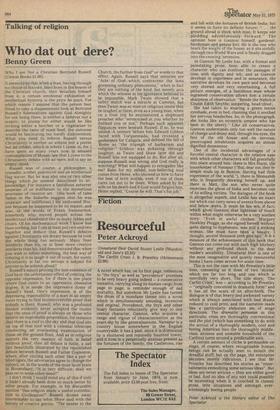Talking of religion
Who dat out dere?
Benny Green
Why I am Not a Christian Bertrand Russell (Unwin Books £1.00).
It seems to be that when a man, having through no choice of his own, been born in the bosom of the Christian church, then detaches himself from it. a certain emotional exhaustion or intellectual hysteria is the price he pays. For which reason I assume that the person best fitted to take a dispassionate look at Bertrand Russell's fulminations against God Almighty for not being there, is neither a believer nor a sceptic; to plump • for either would be like inviting either a butcher or a vegetarian to describe the taste of roast beef; the outcome would be fascinating but hardly disinterested. What you need to' referee Russell versus Christianity is neither an atheist nor a pietist but an infidel, which is where I come in, for I have spent so many years now in amused contemplation of Mosaic law that I come to the Christianity debate with an open, not to say an empty, mind. Russell was of course, a philosopher, a crusader, a rebel, polemicist and an intellectual flag waver. But he was also one or two other things which he seemed disinclined to acknowledge. For instance a fastidious autocrat unaware of or indifferent to the mysterious processes of creative art. (His book of tales Satan in the Suburbs suggest that he was unaware and indifferent.) He enthroned Reason because he happened to be its master, and was, in the words of Frank Swinnerton, somebody who moved people across the intellectual chessboard like so many tables and chairs. Of his mathematical work I know less than nothing, but I can at least put two and two together and deduce that Russell's debates against Christianity are dreary because he took the whole thing too seriously. Many finer intellects than his, or at least more creative intellects than his, had demonstrated that when you wish to refute something, the best way of refuting it is to laugh it out of court, for surely Christianity is far too serious a subject for anyone to be solemn about?
Russell's essays proving the non-existence of God have the unfortunate effect of creating the opposite impression, for if there is one place where God exists to an oppressive, obsessive degree, it is inside the impressive dome of Russell's head. One's impression is of the depressing reasonability of a man in an empty room trying to find incontrovertible proof that nobody is there. Russell, who was a profound thinker evidently never accepted the truism that the onus of proof is always on those who believe an improbable proposition, for instance that there is a roof to the sky and that God sits on top of that roof with a celestial telescope conducting an everlasting examination of those on the ground floor. And as in religious matters the very essence of faith is belief without proof, then all debate is futile, a, sad fact beautifully illustrated by the republished debate between Russell and Father Copleston, where, after circling each other like a pair of blind tigers, the adversaries agree to change the subject, or, in the words of the most lucid brain in Bloomsbury, "It is very difficult; shall we pass on to some other issue?"
1 don't think I would mind any of this if only it hadn't already been done so much better by other people. For example, in his discussiDn entitled "Has religion made a useful contribution to Civilisation?" Russell drones away interminably to say what Shaw said with the brevity of creative genius, -The nearer to the Church, the further from God" or words to that effect. Again, Russell says that miracles are "Acts of God which contravene the laws governing ordinary phenomena," when in fact they are nothing of the kind, but merely acts which the witness in his ignorance believed to be impossible. Mark Twain showed that a safety match was a miracle at Camelot, but then Twain was so wise on religious issues that he laughed at them, even as a young man, when on a river trip he encountered a shipboard preacher who "sermonised at you whether he disliked you or not.Perhaps such apparent flippances were beneath Russell. If so, he was misled. A century before him Edward Gibbon faced with Torquemada, had revealed a, preference for Caligula, and defined the fall of Rome as -the triumph of barbarism and religion." Gibbon was debating through laughter, as Twain and Shaw later did and Russell was not equipped to do. But after all, suppose Russell was wrong and God really is watching? What will happen to renegades like me? Balm for my infidel, non-believing soul comes from Heine, who showed us how to have the best of both worlds, even if one of them turns out not to be there. When asked by his wife on his death-bed if God would forgive him, Heine replied, "Course he will. That's his job."


























 Previous page
Previous page